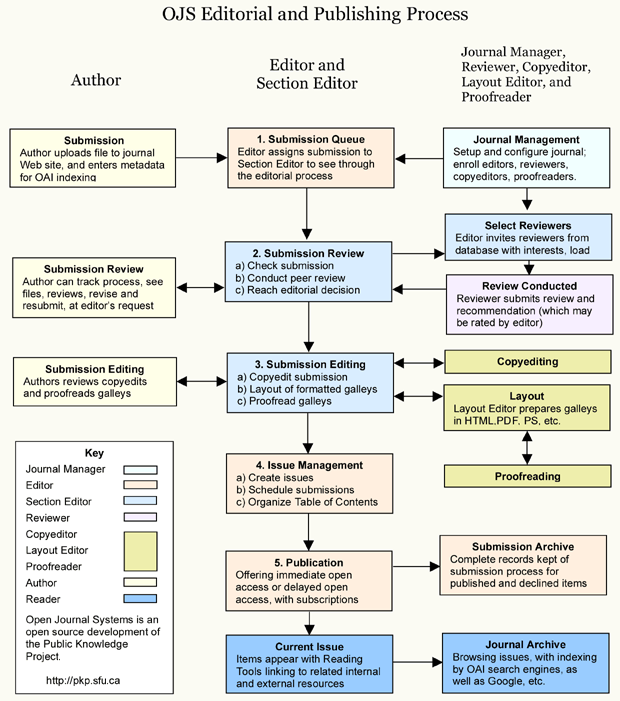- Focus and Scope
- Section Policies
- Peer Review Process
- Publication Frequency
- Open Access Policy
- Archiving
- Plagiarism Check
- References Management
- Retraction
- Indexing
Focus and Scope
Al-Idarah: Jurnal Pengkajian Dakwah dan Manajemen must be in suitable with the focus and scope of the study as follows:
- Manajemen Haji dan Umroh
- Manajemen Zakat dan Wakaf
- Dakwah dan Globalisasi
- Manajemen Keuangan Islam
- Strategi dan Inovasi dalam Dakwah
- Manajemen Mesjid
Section Policies
Articles
Peer Review Process
Al-Idarah: Jurnal Pengkajian Dakwah dan Manajemen implement each accepted manuscript will go through a review process by the Editor and reviewers, using a Double blind Peer-Review Process, which the reviewer does not know the identity of the author, and the author did not know the identity of the reviewer.
Al-Idarah: Jurnal Pengkajian Dakwah dan Manajemen implement policies Double Blind Peer-Review, every manuscript received will be sent to Reviewers who registered in The Al-Idarah: Jurnal Pengkajian Dakwah dan Manajemen. The review process lasts a maximum of up to 30 (thirty) days with the allocation of time given to each reviewer to complete its review process is a maximum of ten (10) working days. If the partners designated bestari previously not able to finish his review work within the time limit specified then chairman of the Chairman of Editorial Board will appoint a replacement to do a review Reviewers manuscript.
In the review process, reviewers provide considerations relating to compatibility between the title, abstract, introduction, discussion (results) and conclusion. In addition reviewer also give consideration associated with novelty, scientific impact and references used
Review Process:
1. Author submit the manuscript
2. Editor Evaluation [some manuscripts are rejected or returned before the review process]
3. Double-blind peer review process
4. Editor Decision (Acceptend Submission, Revisions Required, Resubmit For Review, Decline Submission)
5. Confirmation to the authors
Final decision of articles acceptance will be made by Editors according to reviewers comments. Publication of accepted articles including the sequence of published articles will be made by Editor in Chief by considering sequence of accepted date and geographical distribution of authors.
EDITORIAL PROCESS

Publication Frequency
This journal is published two times a year.
July and December
Open Access Policy
This journal provides immediate open access to its content on the principle that making research freely available to the public supports a greater global exchange of knowledge.
Archiving
This journal utilizes the LOCKSS system to create a distributed archiving system among participating libraries and permits those libraries to create permanent archives of the journal for purposes of preservation and restoration. More...
Plagiarism Check
The Editor may make use of Turnitin & Plagiarism Checker X for checking the originality of submissions received.

References Management
References to other publications must be in American Psychological Association (APA) style and carefully checked for completeness, accuracy and consistency.
Use Reference Management by Mendeley, Zetero, EndNote,

Retraction
The papers published in the Al-Idarah: Jurnal Pengkajian Dakwah dan Manajemen will be consider to retract in the publication if :
- They have clear evidence that the findings are unreliable, either as a result of misconduct (e.g. data fabri-cation) or honest error (e.g. miscalculation or experimental error).
- the findings have previously been published elsewhere without proper crossreferencing, permission orjustification (i.e. cases of redundant publication)
- it constitutes plagiarism
- it reports unethical research
The mechanism of retraction follow the Retraction Guidelines of Committee on Publication Ethics (COPE) which can be accessed at https://publicationethics.org/files/retraction%20guidelines.pdf
Indexing
Al-Idarah : Jurnal Pengkajian Dakwah dan Manajemen is indexed in the following databases


 Al-Idarah:Jurnal Pengkajian Dakwah dan Manajemen i
Al-Idarah:Jurnal Pengkajian Dakwah dan Manajemen i





